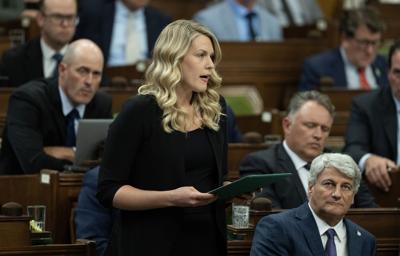OTTAWA — The House of Commons returned Monday with appeals for collaboration and respect for political differences — and a standing ovation following a tribute to Charlie Kirk, the Donald Trump ally and right-wing activist who was assassinated last week in the U.S.
“When has political violence ever been the solution?” Conservative MP Rachael Thomas said. “It destroys dialogue, it undermines democracy, and it breeds fear instead of understanding. True progress comes from persuasion, not intimidation.”
Minutes before, MPs were escorted through barricades on Parliament Hill while dozens of protesters hurled insults at any passersby and police provided tighter security in the nation’s capital.
MPs raised concerns about recent political violence ahead of the House of Commons’ first question period. (Sept. 15, 2025)
The Canadian PressIn the wake of Kirk’s killing, some parliamentarians have raised concerns about political violence spilling into Canada. Police and security sources told the Star they have been on daily alert for a rise in threats or harassment against political actors since Kirk’s killing, but it’s not yet clear if there has been an increase in threats, which have been on the rise for years.
“I think we’re naive as a country about how safe our politicians are, and we’re just one catastrophic disaster away from having a reckoning as a society,” Montreal MP and former immigration minister Marc Miller told reporters Monday, having been loudly booed and heckled as he walked up the steps of Parliament.
“I think those that justify (Kirk’s) death are part of the problem. If they have any opinions about his views, they should at least park it for a week while his family mourns.”
In its postelection report, Elections Canada provided some good news: No criminal activity, cybersecurity incident or foreign interference impacted the administration of the race, and physical security incidents also fell by more than 50 per cent from the 2021 campaign.
Furthermore, the Canadian Security Intelligence Service said “a violent extremist attack targeting a Canadian public official remains unlikely.”Â
“While violent rhetoric and intimidation targeting public officials will very likely continue over the next year, the vast majority of these threats are unlikely to constitute violent extremism,” CSIS said in a statement to the Star.
However, it added that its assessment does not include “the threat of criminal violence, harassment, intimidation, or protests, though we may consider if such activities are indicators of violent extremist intent and escalation.”
But the aftermath of Kirk’s killing has laid bare deep societal divisions, as emotional and polarized responses spilled out over social media. Trump and his supporters immediately vowed to crack down on left-wing groups they blamed for the killing, and his administration has promised to take action against any foreigners who “glorify violence” or “make light” of Kirk’s death.
Canada has not been immune to the polarized response. On Monday, a 23-year-old man was charged in Manotick, an Ottawa suburb, after threats were made against a local high school in response to a staff member’s social media post about the killing. Meanwhile, calls for increased safety measures for political actors have grown louder in recent days.
Signs held up by the crowd outside Parliament included “We are Charlie.” But there was also “Media is the virus,” “F - - k Carney,” and others slamming the Liberal government’s handling of the COVID-19 pandemic and immigration. Ottawa police said two people were arrested at the demonstrations, but no charges had been laid as of Monday afternoon.
Public safety and criminal justice are expected to be major topics in the House of Commons this fall as Prime Minister Mark Carney’s government prepares to table several crime bills.Â
First on the agenda will be a hate-crime bill that will create new Criminal Code offences for wilfully intimidating and obstructing individuals entering places of worship, cultural community centres and schools, Justice Minister Sean Fraser has said. The bill, which will also codify a definition for “hate” to provide increased tools for law enforcement, comes amid a backdrop of tensions in Canada due to the war in Gaza, and as Jewish and Muslim communities report increased fears of hate crimes.
Speaking to reporters, Miller warned any such bill must make sure it doesn’t infringe on Canadians’ right to express themselves.
“I think the devil’s in the details,” he said. “It is a very dangerous road to go down, to limit people’s freedom of expression.
“When you present legislation that is intended in good faith to protect people and institutions where they gather to express their faith, I think we have to balance that carefully.”
The Liberals are also planning to table bills on bail reform and intimate-partner violence.
Vancouver Granville MP Taleeb Noormohamed was among those saying more needs to be done to protect people in politics.
“We’ve already seen the very real implications of what happens when people cross the line from pretty hateful stuff on the internet and they start to bring it forth in real life,” he told reporters. “I’m concerned about my safety because I’ve had threats directly. I’m concerned about the safety of my colleagues who have had threats.”
With files from Tonda MacCharles.
Error! Sorry, there was an error processing your request.
There was a problem with the recaptcha. Please try again.
You may unsubscribe at any time. By signing up, you agree to our and . This site is protected by reCAPTCHA and the Google and apply.
Want more of the latest from us? Sign up for more at our newsletter page.



























To join the conversation set a first and last name in your user profile.
Sign in or register for free to join the Conversation